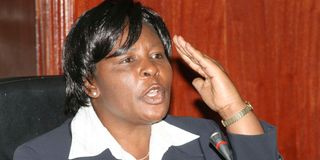Ruto's call to action: Taskforce to tackle gender violence amid alarming cases

Former Deputy Chief Justice Nancy Barasa. She has been appointed to lead a 34-member team that will probe the surge in gender-based violence, including femicide.
What you need to know:
- The acts of violence have not only strained Kenya’s social fabric but also posed a threat to national security.
- The President ordered that gender desks at police stations be enhanced, and similar facilities be introduced in hospitals for survivors to receive immediate attention and care.
The fight against gender-based violence last weekend received a major boost after President William Ruto constituted a taskforce to look into the matter.
Dr Ruto, in a special Gazette notice, appointed former Deputy Chief Justice Nancy Barasa to head a 34-member team that will probe the surge in gender-based violence (GBV), including femicide. Among the terms of reference for the taskforce will be to assess, review and recommend measures to strengthen policies and structures for eliminating GBV and femicide.
He noted that GBV continues to cause physical and emotional harm to individuals and families who are forced to come to terms with the actions of perpetrators while crying out for justice.
“There are existing gaps in prevention, response, investigations, prosecution, data management, and survivor support systems in GBV and femicide cases. Such egregious violations pose a threat to our national security as well as strain the nation’s social fabric,” the Gazette notice read.
Those who have been appointed to the taskforce include Nairobi Women's Hospital founder Dr Sam Thenya, Mohammed Washala, Ruth Aura and Linah Kilimo. The others include Edna Ngare, Nobert Talam, Linda Musumba, Anthony Nzioki, Anne Ngetich, Wangu Kanja, Bashir Isaak, Susan Ndanyi, Gloria Wawira and Seth Masese.
The team has also been tasked with reviewing reports of cases, inviting written submissions from the public and working collaboratively with the National Government Administration Officers to discharge its mandate. It is expected to develop a report within 90 days and shall report to Deputy President Kithure Kindiki through the Gender Principal Secretary.
The establishment of the Technical Working Group comes against the backdrop of alarming statistics on GBV, with a significant rise in the killings of women and girls. According to the United Nations Office on Drugs and Crime report, 725 cases of femicide were reported in 2024, translating into 2.66 per 100,000 women.
The report shows that 47 women are killed in Kenya weekly. About 75 per cent of these killings were committed by someone known to the victims such as an intimate partner, relative or friend. Globally, the report indicates that a woman was killed every 11 minutes last year.
The acts of violence have not only strained Kenya’s social fabric but also posed a threat to national security. The country has recently faced a wave of femicide, with Kenyans, leaders and civil society calling for action.
The taskforce will engage religious leaders, parents, schools, security agencies and other stakeholders to identify gaps in law, enforcement, and social values contributing to the crisis. In November last year, the government announced it will provide Sh100 million for an awareness campaign against gender violence.
Dr Ruto called for collaboration to combat femicide during a meeting with women MPs at State House, Nairobi. “I urge every Kenyan to join this movement, to speak out, to educate and to stand united against femicide.”
The President ordered that gender desks at police stations be enhanced, and similar facilities be introduced in hospitals to ensure victims receive immediate attention and care. “Women leaders and I stand united in declaring that femicide has no place in Kenya. Together, as a nation, through our concerted efforts, we shall eradicate this vice. We must be relentless in protecting the vulnerable in our midst and be unwavering in our mission to create a society where every woman lives in safety, dignity and freedom from femicide.”
Last month, Deputy Inspector General of Police Eliud Lagat said the authorities had recorded at least 97 femicide cases over three months.
Senator Gloria Orwoba has commended the Kenya Kwanza administration for the allocation of Sh100 million to tackle GBV. Addressing the media on issues touching on GBV at Parliament, she said she is advocating better structures to tackle GBV, such as having gender courts that can execute GBV cases in six months.
Gender and Affirmative Action Principal Secretary Ann Wang’ombe in an earlier interview with Nation.Africa hinted at pursuing a multisectoral approach aimed at eradicating gender-based violence. She made the announcement after a meeting that brought together stakeholders, including government agencies, civil society organisations, faith-based organisations, development partners, law enforcement and community leaders, to address the alarming rates of femicide and explore comprehensive solutions.
She said the discussions focused on identifying the root causes of GBV that include societal norms, economic disparities, and inadequate legal protections. “Support systems for victims is paramount, which is why we recognise the urgent need to establish and improve support systems, including shelters, counselling services, and legal assistance for victims of violence. We also need to improve on data collection on femicide and gender-based violence to inform policy decisions and track progress effectively,” Ms Wang’ombe told Nation.Africa.
She added that the advocacy campaign will involve both state and non-state actors, saying every Kenyan has a role to play to tame the vice.
Nairobi Women Hospital CEO Thenya observed that femicide in Kenya is not a government but a societal issue. Terming the situation a national crisis, Dr Thenya revealed that the hospital’s gender violence recovery centres record an average of 4,000 GBV cases monthly.
“It is a crisis and something definitely needs to be done. The economic burden of GBV is enormous on the economy. We must speak against this vice being perpetuated against women and girls. They are our daughters, wives, sisters and mothers,” Dr Thenya told Nation.Africa.





